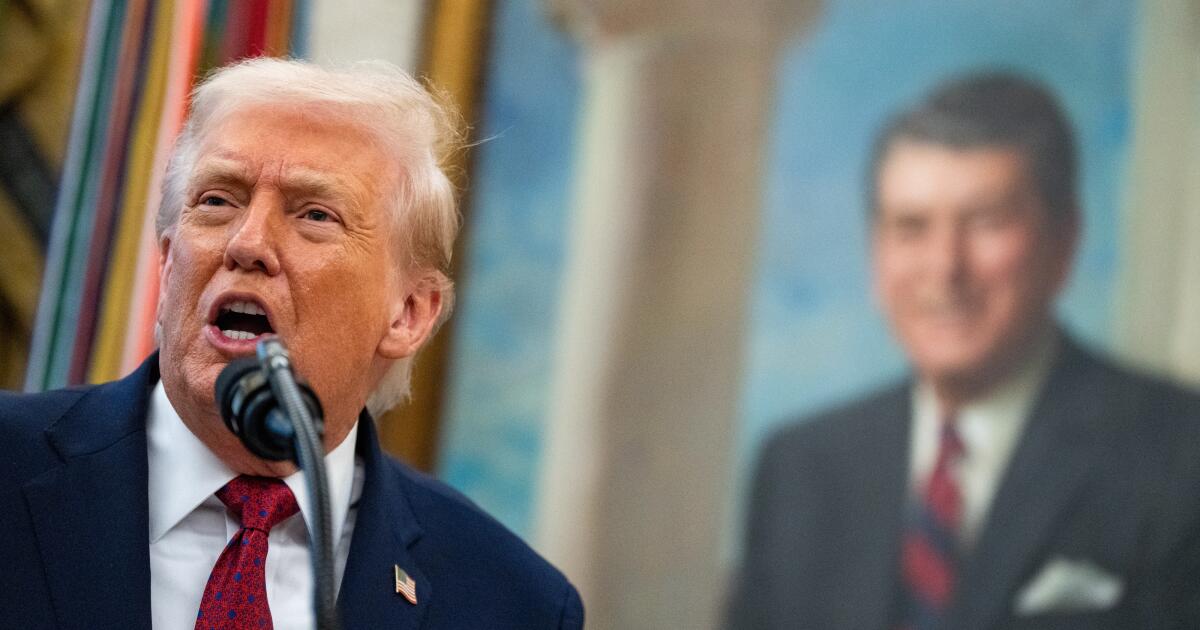Trump’s cruel response to Reiner shows us-versus-them presidency
When word came of Rob Reiner’s senseless death, America fell into familiar rites of mourning and remembrance. A waterfall of tributes poured in from the twin worlds — Hollywood and politics — that the actor, director and liberal activist inhabited.
Through the shock and haze, before all but the sketchiest details were known, President Trump weighed in as well, driving by his diarrhetic compulsion to muse on just about every passing event, as though he was elected not to govern but to serve as America’s commentator in chief.
Trump’s response, fairly shimmying on Reiner’s grave as he wrongly attributed his death to an act of political vengeance, managed to plumb new depths of heartlessness and cruelty; more than a decade into his acrid emergence as a political force, the president still manages to stoop to surprise.
But as vile and tasteless as Trump’s self-pitying statement was — Reiner, he averred, was a victim of “Trump Derangement Syndrome” and, essentially, got what he deserved — it also pointed out a singular truism of his vengeful residency in the Oval Office.
In recent decades, the nation has had a president who lied and deceived to cover up his personal vices. Another who plunged the country into a costly and needless war. A third whose willfulness and vanity led him to overstay his time, hurting his party and America as well.
Still, each acted as though he was a president of all the people, not just those who voted him into office, contributed lavishly to his campaign or blindly cheered his every move, however reckless or ill-considered.
As Trump has repeatedly made clear, he sees the world in black-and-white, red-versus-blue, us-versus-them.
There are the states he carried that deserve federal funding. The voters whose support entitles them to food aid and other benefits. The sycophants bestowed with medals and presidential commendations.
And then there are his critics and political opponents — those he proudly and admittedly hates — whose suffering and even demise he openly savors.
When Charlie Kirk was killed, Trump ordered flags be flown at half-staff. He flew to Arizona to headline his memorial service. His vice president, JD Vance, suggested people should be fired for showing any disrespect toward the late conservative provocateur.
By noteworthy contrast, when a gunman killed Minnesota’s Democratic former House speaker, Melissa Hortman, Trump couldn’t be bothered with even a simple act of grace. Asked if he’d called to offer his condolences to Minnesota Gov. Tim Walz, a personal friend of Hortman, Trump responded, “Why waste time?”
This is not normal, much less humane.
This is not politics as usual, or someone rewarding allies and seeking to disadvantage the political opposition, as all presidents have done. This is the nation’s chief executive using the immense powers of his office and the world’s largest, most resonant megaphone to deliver retribution, ruin people’s lives, inflict misery — and revel in the pain.
There were the usual denunciations of Trump’s callous and contemptuous response to Reiner’s stabbing death.
“I’d expect to hear something like this from a drunk guy at a bar, not the president of the United States,” said Republican Rep. Don Bacon of Nebraska, who is retiring rather than seeking reelection in 2026. (Which may be why he was so candid and spoke so bracingly.)
But this time, the criticisms did not just come from the typical anti-Trump chorus, or heterodox Republicans like Bacon and MAGA-stalwart-turned-taunter Marjorie Taylor Greene. Even some of the president’s longest and loudest advocates felt compelled to speak out.
“This is a dreadful thing to say about a man who just got murdered by his troubled son,” British broadcaster Piers Morgan posted on X. “Delete it, Mr. President.”
More telling, though, was the response from the Republican Party’s leadership.
“I don’t have much more to say about it, other than it’s a tragedy, and my sympathies and prayers go out to the Reiner family and to their friends,” Senate Majority Leader John Thune told CNN when asked about Trump’s response. House Speaker Mike Johnson responded in a similarly nonresponsive vein.
Clearly, the see-and-hear-no-evil impulse remains strong in the upper echelons of the GOP — at least until more election returns show the price Republicans are paying as Trump keeps putting personal vendettas ahead of voters’ personal finances.
One of the enduring reasons supporters say they back the president is Trump’s supposed honesty. (Never mind the many voluminously documented lies he has told on a near-constant basis.)
Honesty, in this sense, means saying things that a more temperate and careful politician would never utter, and it’s an odd thing to condone in the nation’s foremost leader. Those with even a modicum of caring and compassion, who would never tell a friend they’re ugly or call a neighbor stupid — and who expect the same respect and decency in return — routinely ignore or explain away such casual cruelty when it comes from this president.
Those who insist Trump can do no wrong, who defend his every foul utterance or engage in but-what-about relativism to minimize the import, need not remain in his constant thrall.
When Trump steps so egregiously over a line, when his malice is so extravagant and spitefulness so manifest — as it was when he mocked Reiner in death — then, even the most fervent of the president’s backers should call him out.
Do it, and reclaim a little piece of your humanity.
